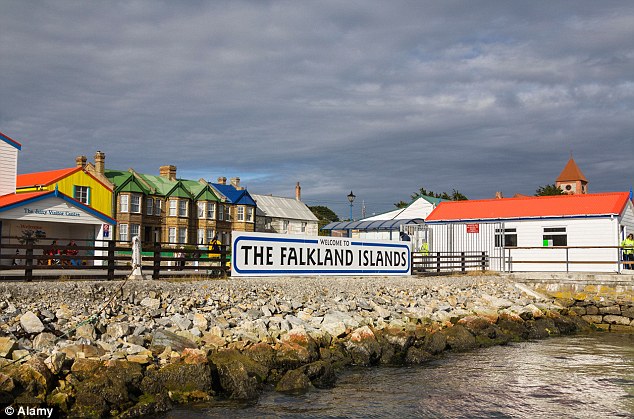The Falkland Islands, also known in Spanish as Islas Malvinas, are a remote British Overseas Territory in the South Atlantic Ocean, about 480 km east of the Patagonian coast of Argentina. The archipelago comprises two main islands — East Falkland and West Falkland — plus more than 770 smaller islands, with rugged coasts, cliffs, and sweeping tussac grasslands. The name derives from Falkland Sound, the strait named in 1690 by English navigator John Strong in honor of Viscount Falkland, while the Spanish name Malvinas stems from the French Îles Malouines used by settlers from Saint-Malo. The capital is Stanley on East Falkland, and the highest point is Mount Usborne at 705 m.
The population is small and stable at roughly 3,600 to 3,800 residents, the majority living in Stanley, with the rest in settlements collectively known as the Camp. English is the official language, with some Spanish spoken by immigrants from Chile and elsewhere. The Islands have internal self government with a unicameral Legislative Assembly, no political parties, and a non partisan tradition. The British monarch is head of state, represented locally by a Governor. A Chief Executive leads the civil service, and an independent judiciary operates under local law.
The Falkland Islands pound FKP is the local currency, pegged 1 to 1 with the British pound GBP, and GBP is widely accepted. The flag is a Blue Ensign with the coat of arms showing a ram and the 1840s ship Desire under sail, with the motto Desire the Right. Law and order are maintained by the Royal Falkland Islands Police. Gambling is legal in small regulated forms such as lotteries and charity events, but there are no casinos. Defense and foreign affairs are the responsibility of the United Kingdom. A volunteer Falkland Islands Defence Force provides local support, while British Forces South Atlantic Islands maintain a substantial presence at Mount Pleasant Complex, including Royal Air Force, Royal Navy and Army elements.
History
The pre European history of the Falklands is not confirmed, and there is no evidence of permanent Indigenous settlement, though Yaghan canoe nomads may have reached the islands. Early European sightings are contested, with 16th century voyages variously claimed, but the first recorded landing occurred in 1690 when English sailor John Strong sailed through the central strait, naming it Falkland Sound. In 1764 the French established Port Louis on East Falkland under Louis Antoine de Bougainville, calling the archipelago Îles Malouines after Saint Malo. The British followed in 1765 with Port Egmont on Saunders Island, asserting their own claim.
Spain, asserting rights via its Bourbon alliance with France, took over the French settlement in 1767 and administered it from Buenos Aires as Puerto Soledad. Tensions peaked in 1770 when Spain expelled the British from Port Egmont, nearly triggering war, but a diplomatic settlement restored the British outpost in 1771. Britain later withdrew its garrison in 1774 for cost reasons, leaving a claim plaque. Spain continued at Puerto Soledad until 1811, also withdrawing and leaving its own sovereignty marker as the Spanish empire unraveled.
In 1820, amid South American independence, privateer David Jewett raised the United Provinces flag at Puerto Soledad to claim the islands. In 1828 merchant Luis Vernet obtained a concession to settle and manage sealing and fishing, renaming the place Puerto Luis. Vernet’s seizure of American sealing vessels prompted the 1831 visit of USS Lexington, which destroyed military stores. In January 1833, a British naval force reasserted British authority, expelling the Argentine garrison but allowing civilians to remain. A new settlement at Port Louis led to the founding of Stanley in 1843, and the Falklands became a Crown Colony in 1840. Sheep ranching expanded, and the now extinct Falkland fox or warrah was hunted out by 1876.
The islands gained strategic maritime importance for coaling and telegraphy. During World War I, the Battle of the Falkland Islands on 8 December 1914 saw a British squadron defeat German East Asia Squadron cruisers off the coast. Through the 20th century, Britain and Argentina intermittently discussed the sovereignty dispute, especially after the 1960s UN decolonization agenda. Islanders consistently voiced a desire to remain British.
On 2 April 1982, Argentine forces invaded, initiating the Falklands War. The UK dispatched a naval task force that retook South Georgia then landed at San Carlos in late May. Battles at Goose Green, Mount Tumbledown, Two Sisters and Wireless Ridge culminated in the Argentine surrender at Stanley on 14 June. The war caused 255 British and 649 Argentine fatalities and left minefields around former battle zones. Post war, the UK strengthened defenses at Mount Pleasant, and the Islands received significant investment in infrastructure, fisheries management and self government. A new constitution in 1985 broadened internal autonomy. In 2013, a referendum returned 99.8 percent in favor of remaining a UK Overseas Territory on a 92 percent turnout, underscoring the Islanders’ self determination. Meticulous demining concluded in 2020, with the last minefields cleared and beaches reopened, symbolizing a new era of safe access and growth.
Industry
The economy rests on four pillars — fisheries, agriculture, tourism and hydrocarbons exploration. Fisheries provide the largest public revenues via licensing and quotas, especially for Patagonian longfin squid Loligo gahi and illex squid, plus hake and toothfish. Agriculture is dominated by sheep ranching for high quality fine wool and increasing volumes of lamb and mutton. Tourism focuses on wildlife, small ship cruises and battlefield history, with a short but valuable season from October to March. Offshore oil and gas exploration has identified prospective fields north of the Islands, with development contingent on commercial viability and environmental safeguards.
There are no globally famous brands headquartered in the Falklands, but distinctive local producers exist, including Falkland Beerworks craft brewery and small batch wool and leather artisans. Food processing, an abattoir near Stanley and service engineering support the primary sectors. Industrial records are modest but notable — the Islands consistently rank among the highest per capita fisheries revenue territories in the South Atlantic, and wool exports punch above the population size. Limited scale, remoteness and strict environmental controls shape an economy that prizes quality, traceability and sustainability.
Flora and fauna
The Falklands host rich sub Antarctic biodiversity with few land predators. Iconic birds include five breeding penguin species — king, gentoo, Magellanic, southern rockhopper and macaroni — alongside black browed albatross colonies, upland geese and the charismatic striated caracara. Endemics include the Falkland steamer duck also called the flightless steamer duck and Cobb’s wren. The endemic Falkland fox warrah is extinct. Marine life features southern elephant seals, South American sea lions, Commerson’s and Peale’s dolphins, and occasional whales.
Vegetation is dominated by tussac grass, heath and dwarf shrubs such as diddle dee and teaberry. Many islands are Important Bird Areas, and several species are of conservation concern — southern rockhopper and macaroni penguins are vulnerable, striated caracara is near threatened, while gentoo and king penguins have stable to increasing local populations. Biosecurity is strict. Export of wildlife and native plants is prohibited without permits, and visitors must clean boots and gear to prevent invasive species spread. There are no venomous snakes or dangerous land animals, but seals, sea lions and skuas can be aggressive if approached too closely. Domestic animals include sheep, cattle, dogs and cats, with pet importation tightly regulated.
Religion and races
Most residents are of British descent, with small but significant communities from Saint Helena, Chile and other parts of the UK and Commonwealth. Christianity is the predominant religion, led by the Anglican Church based at Christ Church Cathedral in Stanley, with Roman Catholic, United Free Church, and other Protestant congregations also present. A sizable minority reports no religion. Community life reflects British traditions with island pragmatism — volunteerism, agricultural shows, and church linked events remain common.
Wars and conflicts
The 1982 Falklands War dominates collective memory, commemorated by memorials in Stanley, San Carlos British Cemetery and the Argentine Military Cemetery at Darwin. Earlier, the 1914 naval Battle of the Falkland Islands is marked each December. Today there is no active conflict on the islands, though the sovereignty dispute persists diplomatically. The territory maintains a defensive posture with British forces at Mount Pleasant and a volunteer local defence force. Landmine clearance completed in 2020 reopened former exclusion zones. Terrorism risk is negligible, and war related fatalities are limited to historical events.
Standard of living
The Falklands enjoy a high standard of living relative to the region, with strong public finances from fisheries, robust infrastructure for a small population, and very low crime. Corruption is minimal, transparency is high, and civic participation is strong. The flip side is a high cost of imported goods due to remoteness, limited housing stock, and small market constraints. International rankings often omit the islands due to size, but by income and services the standard is comparable to developed economies.
Medicine
Healthcare centers on King Edward VII Memorial Hospital in Stanley, supplemented by rural clinics and visiting medical flights. Complex cases are evacuated to Chile or the UK, so visitors are strongly advised to carry comprehensive travel and medical evacuation insurance. Pharmacies and hospital dispensary hours are limited outside business days, and specific prescriptions should be brought in sufficient quantities. Routine vaccinations should be up to date, and tap water is potable.
Sports
Popular sports include football, rugby, cricket, shooting, bowls, badminton and angling. The Falklands field teams at the Island Games and have participated in the Commonwealth Games, especially in shooting. The territory does not compete independently at the Olympic Games. Local leagues are small but spirited, and community events often anchor the sports calendar.
Holidays
Liberation Day 14 June marks the end of the 1982 occupation. Falklands Day 14 August commemorates early European discovery and heritage. Battle Day 8 December recalls the 1914 naval battle. The King’s Official Birthday is observed annually. British tradition public holidays include Good Friday, Easter Monday, Christmas Day and Boxing Day. Peat Cutting Monday in early October reflects rural life and seasonal rhythms.
Traditions
Island culture values courtesy, self reliance and neighborly help. The smoko tea break with cakes is a cherished custom. On private lands, always seek permission, close gates and follow farm tracks to protect pastures and peat. Around wildlife keep a respectful distance, avoid sudden movements and never feed animals. Tourists are expected to leave no trace and to respect the islands’ ongoing sensitivity regarding the sovereignty dispute.
Interesting facts
Penguins and sheep outnumber people many times over, and some rookeries host tens of thousands of birds. Christ Church Cathedral in Stanley is often cited as the world’s southernmost Anglican cathedral, framed by the iconic Whalebone Arch. Charles Darwin visited in the 1830s during HMS Beagle’s voyage, collecting specimens and observing the now extinct warrah. Prince William served a tour at Mount Pleasant as a search and rescue pilot. The Lady Elizabeth shipwreck in Stanley Harbour is a photogenic relic of the age of sail. The last landmines were destroyed in 2020, celebrated with football on a once fenced beach.
Myths and legends
Sailors’ tales linger of ghost lights flickering over the sea on stormy nights and phantom ships near Cape Pembroke. A local custom holds that leaving an old boot at Boot Hill near Stanley grants travelers safe passage. Weather lore and stories of hardy shepherds crossing the peat in whiteouts are part of Camp folklore.
Money
Currency is the Falkland Islands pound FKP, at parity with GBP, and British pounds are widely accepted. Exchange with USD follows GBP markets — as a mid 2025 guide, 1 USD is roughly 0.77 GBP, so 1 FKP is about 1.30 USD. Credit and debit cards are commonly accepted in Stanley, at hotels and larger lodges, but smaller settlements may prefer cash. ATMs are very limited and service can be intermittent, so bring sufficient funds or plan for over the counter cash services. Avoid taking FKP out of the islands, as exchange abroad is difficult. Tipping is discretionary, with 10 percent appreciated in restaurants for good service.
Practical details
Electricity is 240V at 50 Hz with UK type G plugs. Mobile service is provided by a single operator with 2G to 4G coverage in and around Stanley and Mount Pleasant, but coverage drops quickly in rural areas. Roaming can be expensive, and local SIMs are available. Smoking is prohibited in enclosed public places. Internet works but bandwidth is limited and costly compared to larger countries.
Clothing
Dress is practical and layered. Even in summer, windproof and waterproof outerwear, warm mid layers, hat and gloves are essential. Sturdy waterproof boots are recommended for peat and rocky shores. Shorts and sandals are possible on rare warm days, but wind and chill are common. There is no strict dress code, yet modest, functional clothing fits local norms.
Tourism
The Falklands reward careful planning. A classic first visit runs 7 to 10 days — 2 to 3 days in Stanley for museums and nearby wildlife, then FIGAS light aircraft hops to outlying islands like Sea Lion, Saunders or Carcass for penguins, albatross and seals. Battlefield tours of San Carlos, Goose Green and Mount Tumbledown add a day or two. Hikers and photographers often extend to 12 to 14 days to include West Falkland scenery and multiple colonies at different light. Cruise visitors typically get 1 to 3 days of shore excursions during the austral summer.
Accommodation ranges from small hotels and guesthouses in Stanley to comfortable farm lodges in the Camp. Prebooking is essential in peak season, and many sites are on private land requiring guided access or prior permission. Wildlife guidelines emphasize distance, slow movements and biosecurity cleaning. Weather changes fast — always carry extra warmth, water and a charged phone or radio. The experience is intimate, uncrowded and deeply nature focused.
Types of tourism
Wildlife and birdwatching
Ecotourism and photography
Military history and battlefield tours
Hiking and 4x4 overland trips
Angling and coastal kayaking
Small ship and expedition cruising
Tourist attractions
— Volunteer Point — vast king penguin colony on East Falkland, accessible by guided 4x4, not UNESCO
— Christ Church Cathedral and Whalebone Arch — landmark Anglican cathedral and iconic arch in Stanley, not UNESCO
— Gypsy Cove — Magellanic penguins and white sand cove near Stanley, not UNESCO
— Historic Dockyard Museum — maritime, natural history and 1982 war exhibits in Stanley, not UNESCO
— Lady Elizabeth shipwreck — 19th century iron barque in Stanley Harbour, photogenic at low tide, not UNESCO
— San Carlos and Blue Beach Cemetery — 1982 landing sites and memorials, not UNESCO
— Goose Green — settlement and battlefield with memorials and community hall, not UNESCO
— Mount Tumbledown and Two Sisters — battlefield hikes with views over Stanley, not UNESCO
— Cape Pembroke Lighthouse — restored lighthouse at the eastern tip of East Falkland, not UNESCO
— Sea Lion Island — lodge based wildlife sanctuary with elephant seals and orcas, not UNESCO
— Saunders Island — albatross and rockhopper penguins at The Rookery, not UNESCO
— Carcass Island and West Point Island — gardens, birdlife and dramatic cliffs, not UNESCO
— Bertha’s Beach — gentoo penguins and dunes near Mount Pleasant, not UNESCO
— Pebble Island — long beaches, birdlife and aircraft wrecks from 1982, not UNESCO
Non tourist attractions
— FIPASS floating port — modular floating jetty system supporting fisheries and cargo in Stanley
— Stanley Power Station — essential utilities hub for the capital
— Sand Bay wind farm — turbines helping diversify the energy mix near Stanley
— Abattoir and cold storage — agricultural processing facility serving wool and meat exports
— Fisheries Department labs — research and monitoring underpinning sustainable quotas
— Mount Pleasant Complex — military base and airfield with restricted access
— Totem Pole — quirky signpost of distances to distant hometowns on the Stanley outskirts
— Boot Hill — hill with old boots left by travelers for good luck
Local cuisine
Lamb and mutton are staples — from slow cooked stews to roasts. Fresh fish features prominently, including Falklands fish and chips, squid rings and the premium Patagonian toothfish. Smoko brings scones, cakes and biscuits, often with diddle dee jam. Vegetables are imported and from greenhouses, so seasonality matters. Pubs pour local craft beers and UK ales, while wine is largely imported from Chile and Argentina. Meal times follow British norms — breakfast 7 to 9, lunch 12 to 2, dinner 6 to 8. Food safety standards are high and tap water is safe. Tipping of about 10 percent is appreciated but not obligatory.
Why visit
For close encounters with penguins and albatross, empty white sand beaches, big skies and a living sense of history, the Falklands are unmatched. You get wilderness without crowds, authentic hospitality and the satisfaction of going somewhere truly different.
Safety for tourists
The islands are very safe with low crime and no known terrorist threat. Main risks are environmental — cold wind, rough seas, slippery rocks and sudden weather shifts. Keep distance from wildlife, especially sea lions, elephant seals and skuas. There are no poisonous snakes and few hazardous plants. Former minefields were cleared by 2020, yet obey any residual warning signs and stick to marked routes. Public health risks are low, but remote care makes travel and medevac insurance essential. Emergency services are reached by dialing 999. Islanders are welcoming to visitors of different nationalities and backgrounds, though sensitivity around the sovereignty question is advised.
Tourist infrastructure level
Service is personable and efficient, with limited but good quality hotels, lodges and restaurants. Guides are knowledgeable and safety minded. English is universal. Capacity is small, so advance booking is crucial. Connectivity is improving but still constrained, and some card terminals rely on stable links, so carry backup payment methods.
Entry rules
Most visitors receive leave to enter on arrival for short stays if holding a valid passport, proof of onward travel, confirmed accommodation and sufficient funds. Some nationalities must obtain a visa in advance via UK channels on behalf of the Falkland Islands Government. Travel insurance with medical evacuation is strongly recommended and sometimes required by tour providers. Customs and biosecurity are strict — declare food, plants, animal products and soil contaminated gear. Exporting wildlife or artifacts is prohibited. Recreational drones require permission and must avoid wildlife and airfields.
Transport
Within the islands, travel relies on 4x4 vehicles, the Falkland Islands Government Air Service FIGAS and a vehicle ferry linking East and West Falkland between New Haven and Port Howard. FIGAS schedules flights dynamically based on bookings, weight and weather, so plan flexibility. Taxis and small shuttles operate in Stanley, and many lodges arrange transfers. Book transport directly with operators well ahead in peak season.
Car travel
Driving is on the left. Speed limits are typically 25 mph about 40 km h in Stanley and 40 mph about 64 km h on rural roads unless signed otherwise. Many roads are gravel or peat tracks — a high clearance 4x4 with all terrain tires is recommended. Seatbelts are mandatory, headlights in poor visibility are expected, and off road driving damages sensitive peat and is discouraged. Drink driving laws are enforced, and there are no toll roads or speed cameras. Police are professional and there is no culture of roadside bribery. Parking is generally free and informal. Overseas licenses are accepted for visitors.
Noise rules
There is no complex legal code for noise, but quiet is expected in residential areas after evening hours, especially after 22 00. Courtesy goes a long way in small communities.
Daily budget
Budget traveler — 100 to 150 FKP per day for shared lodging, simple meals and a local excursion 130 to 195 USD
Mid range — 200 to 350 FKP per day for hotels, guided tours and restaurant dining 260 to 455 USD
Luxury — 400 FKP and up per day for premium lodges, private guiding and charter flights 520 USD and up
What not to do
Do not approach or touch wildlife, fly drones without permission, remove war relics or natural items, or trespass on private land without consent. Do not light fires on peat, and do not drive off established tracks. Respect memorials and cemeteries. Avoid political arguments about sovereignty with locals unless invited.
Climate
The climate is cool oceanic and windy year round. Summer December to March is mild with typical highs 9 to 16 C, long daylight and frequent sun and showers. Winter June to August is chilly with highs 2 to 5 C, frost and occasional snow. Rainfall is moderate and fairly evenly spread, with microclimates shaped by exposure. The best time to visit for wildlife and access is October to March, when seas are calmer and colonies are active. Weather changes quickly — pack for four seasons in a day.
Tips for travelers
Book flights, lodges and FIGAS segments well in advance. Carry layered clothing, waterproofs, sun protection and binoculars. Keep routine vaccines current and consider hepatitis A depending on habits. Bring enough prescription medication and a personal first aid kit. Take travel and medevac insurance, and plan buffer days in case weather disrupts flights. Clean boots and camera tripods between sites to protect the islands’ biosecurity.
- Facts and tips about sharks
- Haruto Takahashi Found Pirate Treasure in Madagascar
- Zulfiqar: The Legendary Sword and a Tourist Symbol of the Islamic World
- Great Plains (USA)
- Traveling to Russia
- Africa
- Los Angeles
- Indonesia
- Dagestan: between the grandeur of nature and the challenges of tourism
- Everyone says i’m running away
- In the footsteps of Buratino: tourist spots from the beloved fairy tale and film
- Uluṟu-Kata Tjuṯa and Kakadu National Parks Etched in Time
- Where tourists are kidnapped for ransom
- Teatime at Cape Town’s 5‑Star Mount Nelson Hotel
- The Highest Settlements in the World: Life on the Roof of the Planet
- Madagaskar
- Dagestan
- Daring to Explore Again
- Bosnia and Herzegovina
- Domestic animals











